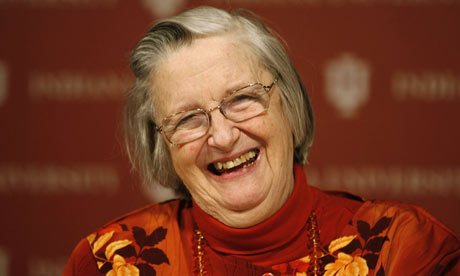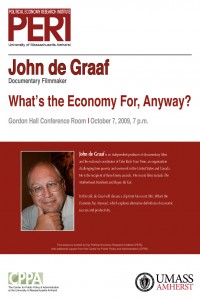Invisible hand needs someone to stir the pot. 22 October 2009 By Matthew Reisz (Times Higher Education Supplement)
Reproduction and childcare tend to get short shrift from dismal science. But Nancy Folbre brings to the fore the impact that sex and family can have on economic activity. Matthew Reisz learns the value of home economics
// In 1714, the economist and satirist Bernard Mandeville published a long poem called The Fable of the Bees, which suggested that prosperity is propelled by avarice and a love of luxury. It made him a notable early advocate of the philosophy – which became something of a catchphrase in the 1980s – that “greed is good”.
A decade later, Mandeville wrote “an essay upon whoring”, A Modest Defence of Publick Stews, which made the case for state-run brothels. The city fathers of Amsterdam were absolutely right, he said, to tolerate “Houses in which Women are hired as publickly as Horses at a Livery Stable”.
This may be an extreme example, but it vividly illustrates the central theme of Nancy Folbre’s bold new book, Greed, Lust and Gender: A History of Economic Ideas, which surveys English, French and American thinkers of the past 300 years.
Economists have had a lot to say about greed, fiercely debating whether the naked pursuit of wealth tends to benefit society as a whole or needs to be held in check. Yet since reproduction and childcare are essential for keeping up the supply of new producers and consumers, they have also unavoidably (though not always openly) had to touch on the issues of gender and lust.
Some writers simply assumed that women would, and should, take responsibility for the domestic sphere. Others have seen the family as a harmonious realm of altruism, quite distinct from the ruthless selfishness of the market, presided over by a benign household head who knows what is best for all its members.
Most of these subtexts are ignored in standard histories of economics. So what happens when they are brought to the surface?
Folbre has been professor of economics at the University of Massachusetts Amherst since 1991. She co-authored the Field Guide to the U.S. Economy (first published in 1988, with subsequent revisions in 1995, 2000 and 2006), as well as The War on the Poor: A Defense Manual (1996), books she describes as “user-friendly resources to help people understand the numbers and overcome their antipathy towards economic analysis”. Next spring will see the publication of her book Saving State U, which argues for greater public investment in American higher education but also addresses “a kind of parental question about how much we should invest in the kids (and in whose kids)”.
Greed, Lust and Gender arises out of Folbre’s continuing research into family and non-market work, such as a current project that involves “measuring the time that parents put into children and asking what you would have to pay for it if it were withdrawn”. It also reflects her longstanding “interest in the philosophical underpinnings of economics as a discipline”.
The book “emphasises the evolution of a moral double standard that gave men more permission than women to pursue individual self-interest”, she says. “It unpacks debates over sexual self-interest, drawing analogies between greed and lust and exploring the double standard there in some detail. And it insists on the importance of non-market work, especially ‘reproductive work’ – the work of bearing, caring for, socialising and educating the next generation – and shows that efforts to bring this topic under close consideration have a long history.”
As this suggests, Folbre is keen to expose how social institutions and economic theories have often “offered men the possibility of inhabiting both worlds, buying their cake and having it homemade for them, too”. Censuses and national income accounts have focused on paid work and apply words such as “dependent, unoccupied, inactive, non-gainful” to those who are not “economically active”. Yet these adjectives, she writes, “reinforced the assumption that men contributed more than women to economic growth … (They) also literally devalued women’s lives, promoting estimates of the value of a human life based primarily on the value of a future earning stream.”
But while Folbre attacks the myopia and open sexism of much economic theory, she is equally concerned to celebrate how the thinkers of the past can still illuminate our current concerns. Seemingly crazy Utopian ideas can become official policy many decades later (although no one has yet adopted the proposal of the 19th-century French socialist Francois Marie Charles Fourier that everybody has a right to a “sexual minimum”, a safety net analogous to the minimum wage).
Ideas can also be co-opted or subverted to serve new agendas. Folbre praises birth control pioneers Margaret Sanger and Marie Stopes, for example, for “seizing the language of individualism, which had traditionally applied to men in the marketplace. They said it applied to women too, in the realm of sex rather than money. I loved the way those ideas morphed in ways very different from those their original progenitors had in mind.”
Of her research for the book, Folbre says: “I had a wonderful time reading and thinking. It also felt very relevant to my policy-related work. I love the force and flow of those ideas. Of course you understand them differently from the people writing then, but they still speak to you and you come back better informed about where you are today. It’s wonderful that you can continue a conversation with some of the people who were thinking about these things hundreds of years ago.”
The textbook idea of the “rational economic man” – calculating, selfish, independent and without attachments to others – has understandably come under fire from feminists, writes Folbre, who want to replace this notion with “an androgynous decision-maker with a complex range of motivations intermediate between the selfish and the selfless”. The plain truth is that we were all once helpless and dependent. “Much as we like to think of ourselves as producers, we are, ourselves, produced.”
Although this may sound like a rather abstract point, it has major policy implications. “We are often told,” claims Folbre, “that Europe risks becoming moribund if it doesn’t drag the hands of retirees off the public purse. But that perspective lacks appreciation of the character of the intergenerational contract.
“The elderly are owed something for what they have produced! The idea that the only thing people do for which they should get a pension is wage work is a little confused, because parents devote an enormous amount of their time and money to raising the next wave of producers and taxpayers. There’s not much discussion of what they should get in return. We need to work out the difference between a parent and a non-parent in terms of what we owe them.”
At the heart of her book, in Folbre’s view, is a 19th-century debate that remains very much alive. “The early socialist feminists”, she writes, “celebrated female altruism and regarded it as a model for society as a whole. In this sense they emphasised the importance of differences between men and women. The early liberal feminists chose a simpler and, in the short run, more successful strategy, celebrating the masculine pursuit of self-interest as a strategy that women could and should adopt for themselves.”
By a strange coincidence, each of these opposing positions was best represented by an intellectual collaboration between a man and a woman, with socialist feminists William Thompson and Anna Wheeler lined up against liberal feminists John Stuart Mill and Harriet Taylor.
“It was very difficult in the first half of the 19th century for women to find an independent voice in philosophical or scholarly discourse,” explains Folbre, “and here are women who managed to do so via their relationship with a man very much aware of gender inequality. Each became the primary voice for a woman and discussed the fact that they were putting forward ideas that were not entirely theirs.
“Somewhat to my surprise, these two couples became the centre and in some ways the anchor of the book … like characters in a novel who take on a life of their own. I have had the pleasure of many imaginary conversations with them. They anticipated much of what I have to say. If my book finds an audience, it will be theirs as well as mine.”
Postscript :Greed, Lust and Gender: A History of Economic Ideas is published by Oxford University Press.
 M. V. Lee Badgett of the Department of Economics and Center for Public Policy and Administration has been chosen to present a Distinguished Faculty Lecture. Her presentation, entitled “From I Can’t To I Do: When Gay People Get Married,” will be held on Monday, November 9th at 4:00 pm in the Bernie Dallas Room, Goodell Building. Free and open to all. A reception follows the lecture. Professor Badgett will receive the Chancellor’s Medal, the highest honor bestowed on individuals for exemplary and extraordinary service to the campus. The lecture series is sponsored by the offices of the Chancellor and the Provost.
M. V. Lee Badgett of the Department of Economics and Center for Public Policy and Administration has been chosen to present a Distinguished Faculty Lecture. Her presentation, entitled “From I Can’t To I Do: When Gay People Get Married,” will be held on Monday, November 9th at 4:00 pm in the Bernie Dallas Room, Goodell Building. Free and open to all. A reception follows the lecture. Professor Badgett will receive the Chancellor’s Medal, the highest honor bestowed on individuals for exemplary and extraordinary service to the campus. The lecture series is sponsored by the offices of the Chancellor and the Provost.


 sponsored by PERI, CPPA, and the Department of Economics at Gordon Hall on Wednesday, October 7, 2009.
sponsored by PERI, CPPA, and the Department of Economics at Gordon Hall on Wednesday, October 7, 2009.